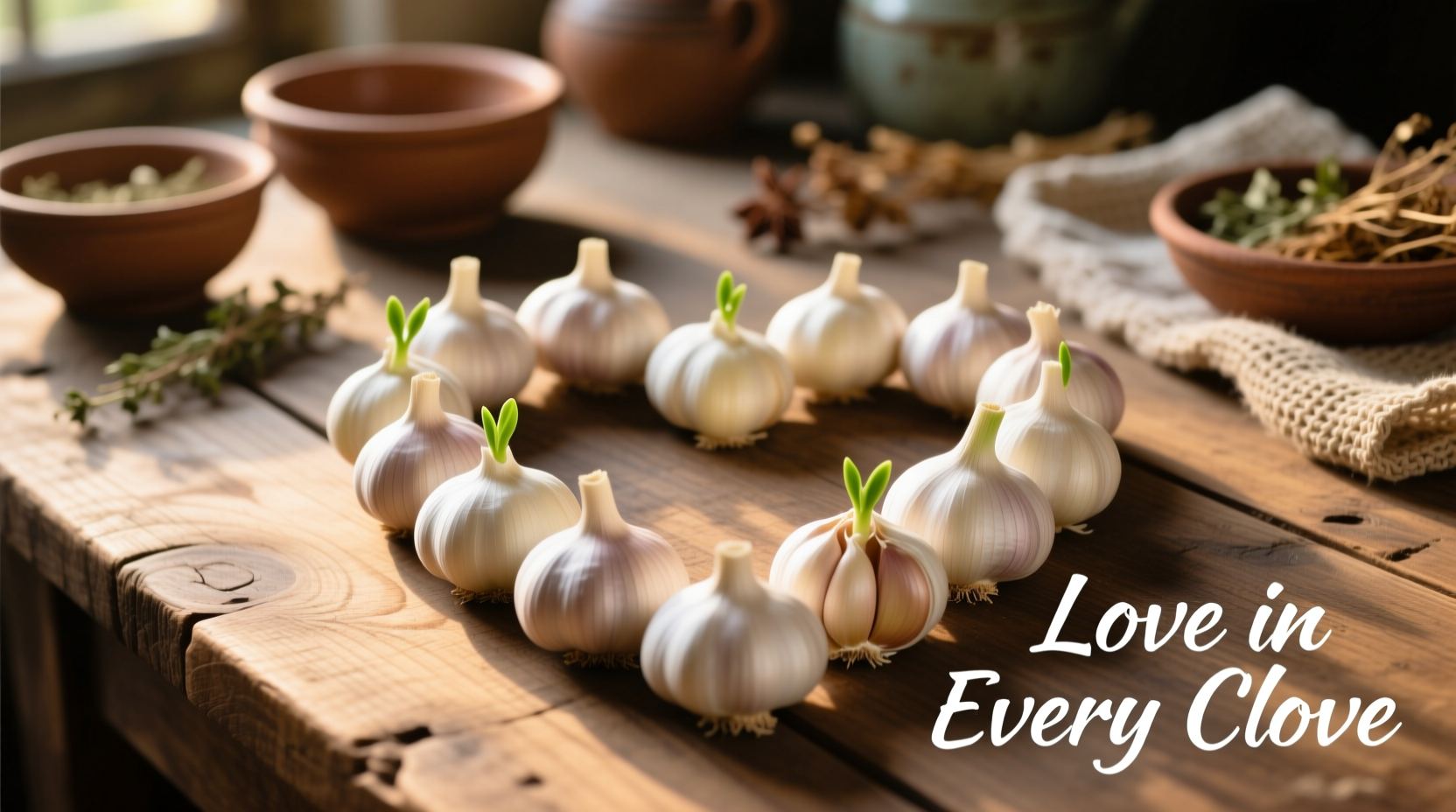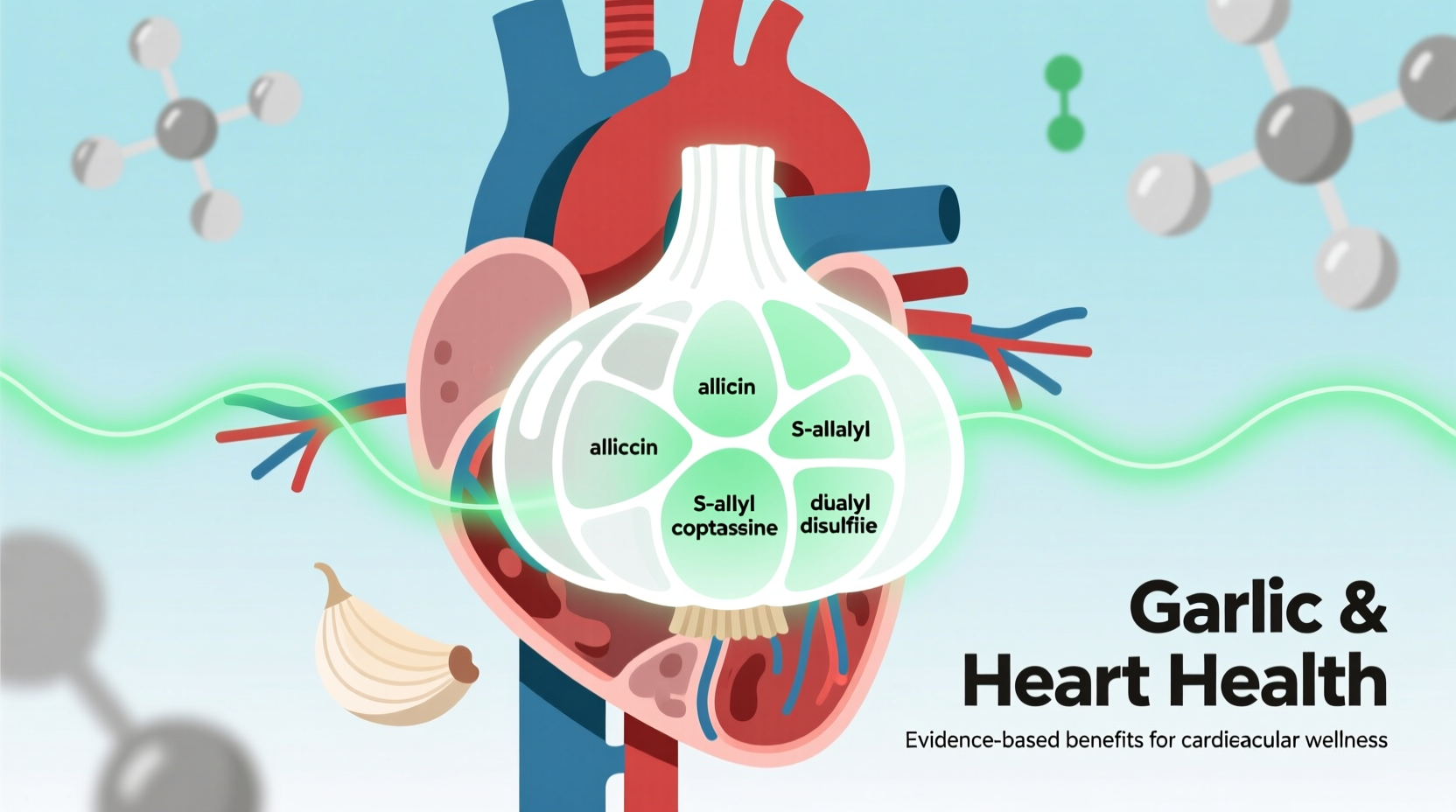For decades, traditional medicine systems have praised garlic's healing properties. Modern science now validates some of these claims, particularly regarding cardiovascular health. If you're considering adding garlic to your heart-healthy regimen, understanding the evidence-based benefits, optimal forms, and realistic expectations is crucial. This comprehensive review examines what current research actually says about garlic's impact on heart health, separating fact from popular myths.
How Garlic Compounds Support Cardiovascular Function
Garlic's heart benefits primarily stem from allicin, a sulfur-containing compound formed when garlic is crushed or chopped. Allicin transforms into other bioactive compounds like diallyl disulfide and S-allyl cysteine, which demonstrate several cardiovascular protective mechanisms:
- Vasodilation effects: Garlic compounds stimulate nitric oxide production, helping blood vessels relax and improving circulation
- Antioxidant properties: Reduces oxidative stress that contributes to atherosclerosis development
- Anti-inflammatory action: Lowers inflammatory markers associated with heart disease progression
- Platelet regulation: May reduce excessive blood clotting without causing dangerous thinning
Unlike pharmaceutical interventions that target single pathways, garlic works through multiple biological mechanisms simultaneously, creating a synergistic protective effect for your cardiovascular system.
What Research Says About Garlic's Heart Benefits
Multiple clinical studies and meta-analyses have examined garlic's cardiovascular effects. The most consistent findings relate to blood pressure management. A comprehensive 2020 meta-analysis published in Experimental and Therapeutic Medicine reviewed 12 randomized controlled trials involving 867 participants. Researchers found that garlic supplementation significantly reduced systolic blood pressure by an average of 6.71 mmHg and diastolic pressure by 4.75 mmHg compared to placebo.
| Study Type | Participants | Blood Pressure Reduction | Duration |
|---|---|---|---|
| Meta-analysis (2020) | 867 across 12 trials | 6.71/4.75 mmHg | 2-24 weeks |
| Clinical trial (2016) | 79 with hypertension | 11.8/7.0 mmHg | 12 weeks |
| Long-term study (2019) | 70 with coronary artery disease | Improved arterial stiffness | 1 year |
While blood pressure effects are most consistent, research on cholesterol shows more modest results. A 2013 review in the Journal of Nutrition concluded that garlic may reduce total cholesterol by approximately 7-8% in individuals with initially elevated levels, though results vary significantly between studies.
Garlic Timeline: Evolution of Cardiovascular Research
Scientific understanding of garlic's heart benefits has evolved significantly over the past 50 years:
- 1970s-1980s: Early observational studies noted lower cardiovascular disease rates in Mediterranean and Asian populations with high garlic consumption
- 1990s: Initial clinical trials focused on garlic's cholesterol-lowering potential with mixed results
- 2000s: Research shifted to blood pressure effects as cholesterol findings proved inconsistent
- 2010s: Standardized aged garlic extract formulations improved study reliability
- 2020s: Current research examines garlic's impact on arterial stiffness and endothelial function
This progression reflects science's growing sophistication in studying complex botanical compounds. Early research often used inconsistent garlic preparations, making results difficult to replicate. Modern studies increasingly use standardized extracts with verified allicin potential, yielding more reliable data.
Fresh Garlic vs. Supplements: Making the Right Choice
Not all garlic forms deliver equal cardiovascular benefits. Understanding these differences helps optimize your approach:
- Fresh garlic: Contains alliin, which converts to allicin when crushed. Requires proper preparation (crush and wait 10 minutes before cooking) to maximize benefits. One clove contains approximately 5-18 mg of allicin potential.
- Aged garlic extract (AGE): Most researched form for heart health. Contains stable compounds like S-allyl cysteine. Standardized doses typically range from 600-2,400 mg daily.
- Garlic powder: Variable allicin content depending on processing. Typical dose is 600-1,200 mg daily.
- Garlic oil: Primarily contains diallyl sulfides, lacks allicin. Less studied for cardiovascular benefits.
The American Heart Association notes that while garlic shows promise, it shouldn't replace prescribed medications for significant hypertension or cholesterol issues. Think of it as complementary support within a comprehensive heart-healthy lifestyle.
Practical Guidelines for Heart-Healthy Garlic Consumption
For those seeking cardiovascular benefits, these evidence-based recommendations can help maximize garlic's potential:
- Daily intake: Consume 1-2 cloves of fresh garlic or 600-1,200 mg of aged garlic extract
- Preparation matters: Crush fresh garlic and let sit 10 minutes before use to activate allicin
- Timing: Consume garlic with food to minimize digestive discomfort
- Consistency: Benefits require regular, long-term consumption (at least 2-3 months)
- Realistic expectations: Modest improvements, not dramatic changes
When incorporating fresh garlic into your diet, add it toward the end of cooking to preserve heat-sensitive compounds. Raw garlic provides maximum allicin but may cause digestive upset for some people. Those with sensitive stomachs often tolerate cooked garlic better while still receiving cardiovascular benefits.

Important Considerations and Limitations
Garlic's heart benefits come with important caveats that affect its suitability for different individuals:
- Medication interactions: Garlic may enhance blood-thinning medications like warfarin. Consult your doctor before combining.
- Timing matters: Effects develop gradually over weeks or months, not immediately
- Individual variation: Genetic factors affect how people metabolize garlic compounds
- Not a replacement: Cannot substitute for prescribed heart medications in moderate to severe conditions
- Digestive sensitivity: Some people experience heartburn or gastrointestinal discomfort
The National Institutes of Health advises that while garlic shows promise for cardiovascular support, it works best as part of a comprehensive approach including a Mediterranean-style diet, regular exercise, and stress management. Those with bleeding disorders or scheduled surgery should discontinue high-dose garlic supplements at least two weeks beforehand due to potential bleeding risks.
Simple Ways to Incorporate Heart-Healthy Garlic
Adding therapeutic amounts of garlic to your daily routine doesn't require complicated recipes:
- Blend one crushed clove into salad dressings or hummus
- Add minced garlic to soups during the last 5 minutes of cooking
- Roast whole garlic heads and spread the soft cloves on whole-grain toast
- Combine crushed garlic with lemon juice and olive oil for fish or vegetable marinades
- Take standardized aged garlic extract supplements with meals
Remember that consistency matters more than single large doses. Daily moderate consumption provides more cardiovascular benefit than occasional large amounts. Pair garlic with other heart-healthy foods like tomatoes, leafy greens, and olive oil to create synergistic nutritional effects.











 浙公网安备
33010002000092号
浙公网安备
33010002000092号 浙B2-20120091-4
浙B2-20120091-4